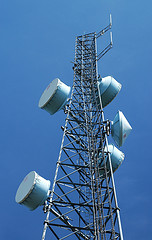It’s been a very long time coming but the U.K.’s 4G auction process has kicked off, with bidders having until 16:00 GMT today to submit their bids, along with a £100,000 deposit. The window for bidders to submit opened at 10:00 GMT.
The spectrum going under the hammer sits in the 800MHz and 2.6GHz bands — and has been deemed suitable for 4G/LTE services. The 800MHz band was freed up when the U.K. completed its switch from analogue to digital TV earlier this year.
Telecoms regulator Ofcom will be reviewing the applications, including conducting vetting of bidders and checks on the information they submit. Ofcom said it plans to announce the names of all successful applicants before the end of the year or early in the New Year. Bidding will then begin in January 2013 — with the regulator anticipating it will be “a number of weeks” before the final result of the auction is known.
The U.K. government has already put a figure on how much it expects the auction to raise, the Chancellor George Osborne factored in £3.5 billion — to be raised from the spectrum sale — in his autumn budget statement last week.
As for bidders, U.K. carriers O2 and Vodafone are expected to be among those submitting applications to bid on the spectrum. EE, which owns the Orange and T-Mobile carrier brands, has already launched its 4G network in refarmed 2G spectrum so does not need to acquire new spectrum to run 4G. EE sold a portion of this 4G-suitable spectrum to smaller U.K. carrier, Three — meaning Three also does not necessarily need to acquire more spectrum to launch a 4G network.
Ofcom notes that the two bands being auctioned are being packaged into “smaller lots” so that they can be acquired by “multiple operators”.
According to the regulator, the lower frequency 800MHz band is “ideal for widespread mobile coverage”, while the higher frequency 2.6 GHz band is “ideal for delivering the capacity needed to deliver faster speeds to large numbers of consumers in towns and cities across the UK”.
Taken together the two bands add up to 250 MHz of additional mobile spectrum — compared to 333 MHz in use in the U.K. today.
While there may not be much drama in the announcement of a bidding window opening, it’s been a long hard road for Ofcom and the U.K.’s mobile industry to get to this point — and, crucially, to move beyond the threats of legal action that have dogged the process for years.
A recent pressure point was Ofcom’s decision to allow EE to refarm its 2G spectrum for 4G — a move which initially angered the other carriers but ultimately led to an agreement being hammered out between all the carriers, in discussions with Ofcom and the U.K. government. That agreement has resulted in an accelerated auction timetable — with up to five months shaved off the rollout schedule next year — and the U.K.’s first 4G network now live, launched at the end of October.
